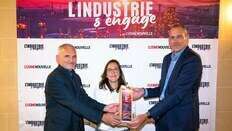
Innovative Collaboration
BASF Coatings, Renault Group, and Dürr have collaborated to develop the Overspray-Free Application (OFLA) process, also known as Jetprint at Renault. This innovation has set new standards in automotive manufacturing by achieving 100% paint transfer efficiency with zero overspray.
Award Recognition
The OFLA process was recognized with the “Trophée de l’Industrie s’engage 2025” in the Innovative Process category at the “L’industrie s’engage par l’Usine Nouvelle” event in June 2025. This award highlights the process as a breakthrough in sustainable application technology, redefining two-tone vehicle painting.
Implementation and Impact
Implemented at Renault’s Maubeuge plant, the OFLA process introduces a wet-on-wet paint application that allows two colors to be applied in a single pass. This method reduces operational costs and process time while minimizing environmental impact. Traditional methods required vehicles to pass through the paintshop twice, involving labor-intensive masking and significant waste.
Technological Advancements
The OFLA process uses a mist-free, high-precision jet-based application system inspired by digital printing technology. This enables accurate coating application without overspray, eliminating the need for masking materials. Dürr’s EcoPaintJet Pro and robotic automation ensure precise application, supported by coordinated sensors and software.
Environmental and Economic Benefits
Compared to conventional methods, the OFLA process reduces process costs by up to 70% and cuts waste by 1.6 kg per vehicle. Energy consumption and CO₂ emissions have decreased by up to 80%, demonstrating significant environmental and economic advantages.

